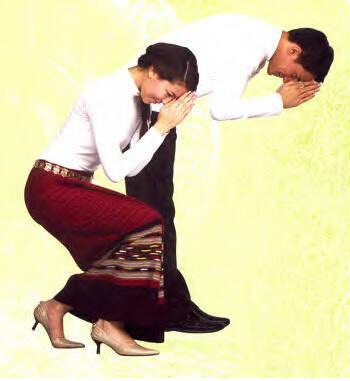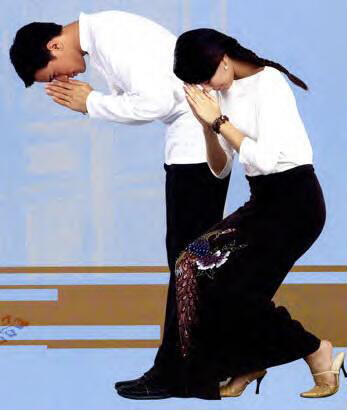








Form
1. Attitudes of greet.
2. The effects of foreign culture.
3. You were not established when you were young.
4. A person who is greeted greet don’t attend.
5. It’s not necessary to do.
Sawatdee is used to say in the same occasion of “Hello” in English ; furthermore, Sawatdee means in Thai that goodness,beauty,prosper and safe.We can also use it for goodbye.
Thai usually say Sawatdee together with greeting by bringing the hands together to the face called “Wai”.
Today the greeting “Wai” is obvious of Thailand culture which the most foreigners know.
The greeting “Wai” has 3 kinds.
1.Greeting for Buddhism and monks.
Men - Your thumbs are between the eyebrows and then persist your face and your back
and say, “Na-mus-sa-karn-krub”*
Women – Your thumbs are between the eyebrows. Step your one of foots back before persisting your face and your back and say, “Na-mus-sa-karn-ka”*

Namussakarn is the same meaning of Sawatdee but Namussakarn use for only the monks.
2.Greeting for parents and ancestors.
Men – Your thumbs are under the nose so the index fingers are between eyebrows.Persist your face and back higher than the first kind and say, “Sawatdee krub”
Women - Your thumbs are under the nose so the index fingers are between eyebrows.You sometimes step one of foots back before persisting your face and back higher than the first kind and say, “Sawatdee ka”

3.Greeting for the older people and friends
Men - Your thumbs are under the chin so the index fingers are under the nose.Persist your face and back higher than the second kind and say, “Sawatdee krub”
Women - Your thumbs are under the chin so the index fingers are under nose.You sometimes step one of foots back before persisting your face and back higher than the second kind and say, “Sawatdee ka”

Yim Siam the weapon for attract people of Thailand
Smile and laugh usually come together when we’re happy,when you meet a funny event we can’t help smiling and lughing.
Biologist invented that when we smile or laugh the hormone “Endrophine” is flowed immediately that is a cause why we feel happy .However,there’s a kind of smile called “Yim Siam” can make you me or author happy. Thais always smile like this to the foreigners who come and they’ll be full of happiness and loveness.That’s why foreigners love Thailand.
Smile can relieve you from fear,stress,sadness and pains.So we should begin smiling and laughing before they come into your life and make you unhappy. And you don’t forgot to send your smile to author who is getting into the problem.Your happyful smile will be his will power to face the problem and will be the strength to carry on his life before it’s too late.
How to say hello in different Languages?
Have you ever stopped to consider how many people are saying "hello" to each other today and in how many different languages? If you wanted to say "hello" to everyone on the planet, you would have to learn at least 2,796 languages and say "hello" to at least 6,500,000,000 (six and a half thousand million) people, (or six and a half billion, in numbers used in the US). Here are some of the ways of saying "hello" around the world.
1. Armenian- Barev or Parev
2. English - Hello (formal), Hi (informal), Hey (informal)
3. French – Salut (informal, silent "T"), Bonjour (formal, 'n' is a nasal vowel), Bonsoir (good evening, 'n' is a nasal vowel), Bonne Nuit (good night). There is also "Ca Va", but this is moreso used as "How are you?"
4.Bahamas – Hello (formal), Hi and heyello (informal), What you sayin Buyh (very informal - slang)
5.German – Hallo (informal), Guten Tag (formal) pronounced Gu-ten (like goo)-tan Tag like Prague, Tag (very informal). The G in "Tag" is pronounced like Tah-ckh. The A makes an Ah-sound.
6. Chamorro- Hafa Adai(hello/what's up?), Hafa??(informal), Howzzit brobran/prim/che'lu?(informal),Sup(informal)and all other Hello's in english work.
7. Bavarian and Austrian German – Grüß Gott (Gruess Gott), Servus (informal, also means "goodbye", pronounced zair- voos)
8. Northern German – Moin Moin
9. Spanish – Hola (pronounced without the H sound, ola),alo, Que Onda (South America)
10. Slovak – Dobrý bodyeny] (formal), ahoj [ahoy], čau [chow] and dobri (informal)
11.Welsh – North Wales = Shwmai (Pronounced shoe-my) Optional throughout Wales = Twll Din Pob Saes (Pronounced - too-ll dean pobe saees)
12. Tsonga (south Africa) – Minjhani (when greeting adult people)– Kunjhani (when greeting your peer group or below your age)
13. Japanese – Ohayou gozaimasu (O-HA-YOH GO-ZA-EE-MAS); Konnichi wa (KOHN-NI-CHEE-wa) (Daytime or Afternoon); Konban Wa (KOHN-BAHN-Wa)(Evening); Moshi Moshi (MO-SHE MO-SHE)(When answering the phone)
14. Italian – Ciao (informal), Salve, Buon giorno (Morning, formal), Buon pomeriggio (Afternoon, formal), Buona sera (Evening, formal)
15. Swedish – Hej (informal), God dag (formal)
16. Arabic-based languages – As-salaam-aleykum (Peace be on you) or Marhabah (Hello)
17. Arabic – Sabbah-el-Khair (Good morning) Masaa-el-Khair (good evening); note that (Kh) is pronounced from the back of the throat. Marhaba (Hello!)
18. Persian – Salaam or Do-rood (see note above - Salaam is an abbreviation, the full version is As-salaam-o-aleykum in all Islamic societies)
19. Hindi – Namaste (pronounced Na-mus-thei), kaise hain (a little formal), kaise ho (more informal, familiar)
20. Korean – Ahn nyeong ha se yo (formal), Ahn nyeong (informal. Can also be used as "Goodbye")
21.Classical Latin – Salve! [pronounced sal-way](Salvete! [pronounced sal-way-tay], if you're talking to multiple people)
22. Dutch – Hoi (very informal), Hallo (informal), Goedendag (formal)
23. Russian– Pree-vyet (informal), Zdravstvuyte (formal, pronounce: ZDRA-stvooy-tyeh)
24. Romanian is Buna (bu-nhuh)
25. Chinese, Mandarin – Ni hao (pronounced knee how)
26. Chinese, Cantonese – Nei Ho
27. Hebrew – Shalom (which means hello, goodbye and peace) Hi (informal)
28. Norwegian – Hei (Hi), Hallo (Hello), Heisan(Hi there), Halloisen (very informal)
29. Portuguese – "Oi", "Boas", "Olá" or "Alô" (informal), Bom dia (good morning), Boa tarde (good afternoon), Boa Noite (good evening)
30. Danish – Hej (informal), God dag (formal), God aften (evening - formal), Hejsa (very informal).
31. Burmese – Mingalarbar
32. Turkish – Merhaba (Formal) Naber? (Informal)
33. Lithuanian – Laba diena (formal) Labas, Sveikas (informal male) Sveika (female) Sveiki (plural)
34. Tagalog (Philippines) – Mabuhay (Welcome);Kumusta Ka (How are you); Magandang Umaga (Good Morning); Magandang Hapon (Good Afternoon); Magandang Gabi (Good Evening/Good Night)
35. Esperanto – Saluton
36. Telugu – Namaskaram
37. Tamil – Vanakkam
38. Swahili – Jambo
39. Sinhala – A`yubowan (Aa-yu-bo-wan) means "long live"
40. Lingala – Mbote
41. Indonesian – Selamat Pagi (Good Morning), Selamat Siang (Good Afternoon), Selamat Malam (Good Evening)
42. Nepali – Namaskar, Namaste, K cha (informal), kasto cha
43. Polish – Dzień dobry (formal), Cześć (informal)
44. Hawaiian – Aloha
45. Local Hawaiian Pidgin – 'Sup braddah!
46. Thai – Sawa dee-ka (if you're a girl)/ Sawa dee-krap (if you're a guy)
47. Hungarian, Magyar – Jo napot [yoh (as in the word "oh") naput](Good-day, formal), Szervusz [Sairvoose] (informal)
48. Czech – Dobré ráno (until about 8 or 9 a.m.), Dobrý den (formal), Ahoj (informal)
49. Ukranian – Dobriy ranuke (formal)- Good Morning, Dobriy deyn (formal) - Good Afternoon, Dobriy vechir (formal)- Good Evening, Pryvit (informal)
50. Latvian – Labdien, sveiki, chau (informal sound like in Italian)
51. Finnish – Hyvää päivää (formal) - Moi / Hei (Informal) - Moro (Tamperensis)
52. Greek – Yia sou (Ya-soo) (informal), yia sas (formal)
53. Icelandic – Góðan dag (formal), Hæ (informal)
54. Malayalam – Namaskkaram
55. Urdu – Adaab
56. Telugu – Baagunnara (how are you) (formal)
57. Chichewa – Moni Bambo! (to man) / Moni Mayi! (to woman)
58. Oshikwanyama – Wa uhala po, Meme? (to woman) / Wa uhala po, Tate? (to man) (response: ee) Nawa tuu? (response: ee) (formal) Ongaipi? (how is it? - informal)
59. Nahuatl – Niltze, Hao
60. Hacker/1337 – |-|3||0 or |-|1
61. Croatian – Boke (informal), dobro Jutro (Good Morning), Dobar dan (Day), Dobra Većer (evening), Laku Noć (Good Night)
62. Navajo – Ya'at'eeh. (Hello!)
63. Maltese – Merħba (welcome), Bonġu (Good Morning), Bonswa (or) Il-lejl it-tajjeb (Good Evening)
64. Congo – Mambo
65 .Jibberish – Huthegelluthego, H-idiguh-el l-idiguh-o (hello,formal), H-diguh-i(hi, informal), H-idiguh-ow a-diguh-re y- idigah-ou? (how are you?)Jibberish
66. Senegal – Salamaleikum (see 11.)
67. German-speaking parts of Switzerland – Grüzi! (Grew-tsi)
68. Scanian – Haja (universal), Hallå (informal), Go'da (formal), Go'maren (morning greeting), Go'aften (evening greeting)
69. Luxembourgish – Moïen (MOY-en)
70. Samoan – Talofa (Formal), Malo (informal)
71.Tongan – Malo e leilei
72. Tahitian – Ia Orana
73. Tetum (Timor - Leste)– Bondia (Good Morning), Botarde (Good Afternoon), Bonite (Good Evening)
74. Maori – Kia ora
75. Romanian – Salut; Buna dimineata/ziua/seara (respectful good morning/day/evning); Buna (usually for girls)
76. Gujrathi – Kem Che
77. Marathi – Namaskar
78. Surfer – 'tsup?
79. South African English – Hoezit (Howzit) (Informal Greeting)
80. Lao – Sabaidee (sa-bai-dee)
81. Kanien'kéha (Mohawk) – Kwe Kwe (Gway gway)
82. Serbian – Zdravo (informal), dobro jutro (Good morning), Dobar dan (Good afternoon, also used as a formal greeting), dobro veče (pronounced as "dobro vetche", means Good evening), Laku Noć (Good Night)
83. Kannada — Namaskara
84. Mongolia – Sain baina uu? SA-YEN BAYA-NU(Formal); Sain uu? SAY-NU(Informal); Ugluunii mend (Good morning, pronounced as 'oglony mend', 'o'sound like 'old'); Udriin mend (Good afternoon, pronounced as 'odriin mend', again 'o'sound like 'old'); Oroin mend (Good evening, pronounced as 'oroin mend', but here 'o' sound like 'orc')
85. Slovenian — živjo (informal(ž sounds like zh); dobro jutro (good morning); dober dan (good afternoon); dober večer (good evening (č sounds like ch in chips)
86. Gaeilge — Dia Duit (informal(Pronounced Gee ah Ditch) Literal Translation God be with you.
87. Kurdish — Tsoni(hi,hello) Roj Bas("Good Day") (ROHZJ BAHSH)
88. Bengali — Namaskar, Salamwalaikum (see 14)
89. Igbo — Nde-ewo (pronounced enday aywo; Nna-ewo (pronounced enna wo)
90. Zulu- sawubona
91. Northen Shoto- dumelang
92. Yiddish-Sholem Aleikhem (may peace be unto you), Borokhim Aboyem, or "Gut Morgn" (good morning,), "gutn ovnt" (good evening), "Gutn Tog" (Good day) and on the Sabbath "gut Shabbos".,
93. Basque – Kaixo (Hello, Hi, pron. Kai-show), Egun on (Good morning, pron. egg-un own) Gau on (Good night, pron. gow own)
94. Pig Latin - Eyhay (informal), Ellohay (formal), Hatsway puay? (Whats up?)
95. Texan - Howdy (informal)
96. Canada - ey there!
97. Vietnamese - Xin Chào
98. Bulgarian -Zdraveite , Zdrasti(informal)
99. Georgian - Gamardjoba
100. Hindustani- Namaste (hello)
Greeting in Japanese style
only Thailand but also Japan has own greeting by persist face and back to each other when meet. It’s not called Wai but called Rei or Ojigi.Japans always use greeting like this for many ways;meeting,saying goodbye and thanks as the situations

Japanese Greeting has 3 kinds….
1.Greeting for friends,brother,sister,etc. (Eshaku)
Persist back for ¼ of the right angle.
2.Greeting for relatives or conworkers. (Futsuu Rei)
Persist back for ½ of the right angle.
3.Greeting for ancestors or the older ones. (Saikei Rei)
Persist back for ½ of the right angle,too.
How to greet People from Philippines?
Don't be too worried. The people of the Philippines are very used to English words. If you are just saying hello to just say hello, then hel-lo, use "hello". The same is true for saying Good Morning, Good Afternoon, etc. If you are trying to impress someone, then say "Kumusta kayo." It's pronounced /kɘ - mu:s - ta: ka: - yo:/
Remember that everything you read in Tagalog is phonetic. Try to sound it out the way you see it. Thepronunciation of vowels are harder than the American accent but softer than the British accent. All the vowels are unrounded except for /o/.
If you want to learn Tagalog (the Philippine national language) you can learn from a book, CD, or someone you know
If you're talking to someone who's older than you or has a higher position than you, don't forget to add"po"Where to add it in the sentence depends. Substitute "opo" for "o'o"(yes).
If you get stuck and don't know what to say, speak in English, since most Filipinos can understand it. But if you wanna impress them, then go ahead and study the language

1. Attitudes of greet.
2. The effects of foreign culture.
3. You were not established when you were young.
4. A person who is greeted greet don’t attend.
5. It’s not necessary to do.
* Didstribute the questionnaires to class 1/1, class 4/1,class 5/1 *
Chart shows opinions only “agree” of the students
From “What are the courses that why do you don’t greet to teachers ?”
Chart show opinions only “disagree” of the students
From “What are the courses that why do you don’t greet to teachers ?”
Chart shows opinions only “agree” of the students
Do the bookmarks make you change your mind?
Chart shows opinions only “disagree” of the students
Do the bookmarks make you change your mind?
1.It make you do realize about WAI and SMILE.
2. It make you think about thai’s culture.
3. You want to WAI and SMILE with orther people .
4. You can use it to mark your book Only.
5. Don’t have any opinion.
* Didstribute the questionnaires to class 1/1, class 4/1,class 5/1 *
When we keep all form’s example group found that why Thai society has changed very greatly for both living condition and a good relationship because the attitudes of greet, The effect of foreign culture, You were not established when you were young, A person who is greeted don’t attend and it’s not necessary to do



